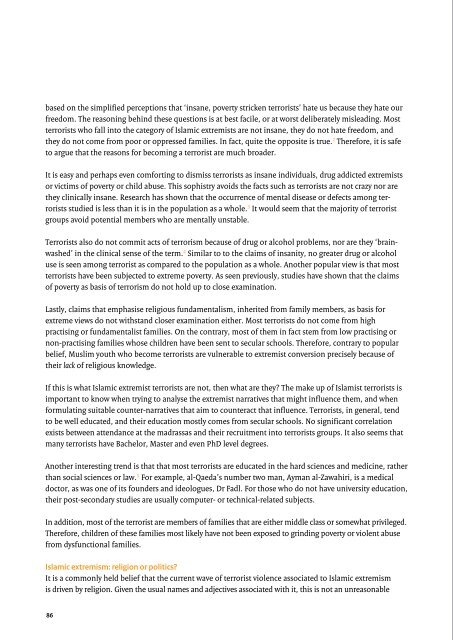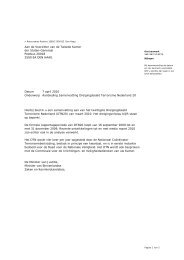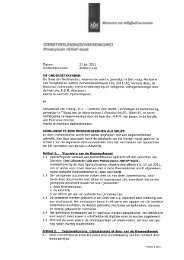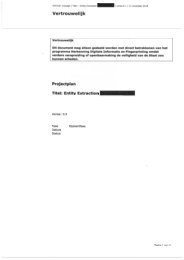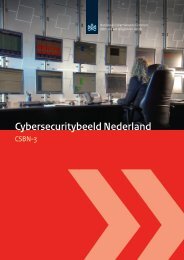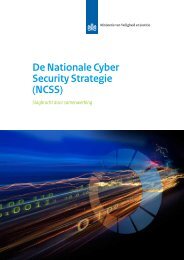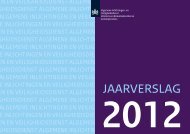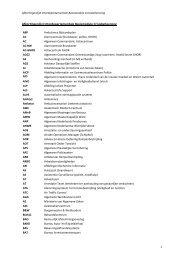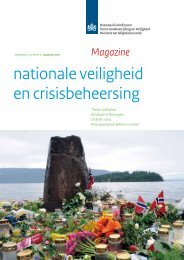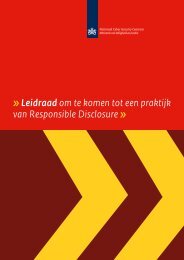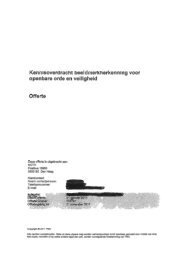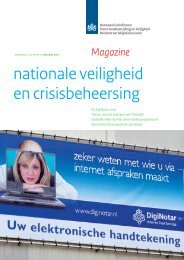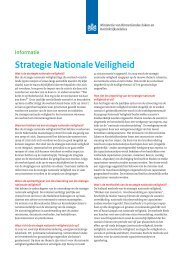Countering Violent Extremist Narratives
Countering Violent Extremist Narratives
Countering Violent Extremist Narratives
- No tags were found...
You also want an ePaper? Increase the reach of your titles
YUMPU automatically turns print PDFs into web optimized ePapers that Google loves.
ased on the simplified perceptions that ‘insane, poverty stricken terrorists’ hate us because they hate ourfreedom. The reasoning behind these questions is at best facile, or at worst deliberately misleading. Mostterrorists who fall into the category of Islamic extremists are not insane, they do not hate freedom, andthey do not come from poor or oppressed families. In fact, quite the opposite is true. 2 Therefore, it is safeto argue that the reasons for becoming a terrorist are much broader.It is easy and perhaps even comforting to dismiss terrorists as insane individuals, drug addicted extremistsor victims of poverty or child abuse. This sophistry avoids the facts such as terrorists are not crazy nor arethey clinically insane. Research has shown that the occurrence of mental disease or defects among terroristsstudied is less than it is in the population as a whole. 3 It would seem that the majority of terroristgroups avoid potential members who are mentally unstable.Terrorists also do not commit acts of terrorism because of drug or alcohol problems, nor are they ‘brainwashed’in the clinical sense of the term. 4 Similar to to the claims of insanity, no greater drug or alcoholuse is seen among terrorist as compared to the population as a whole. Another popular view is that mostterrorists have been subjected to extreme poverty. As seen previously, studies have shown that the claimsof poverty as basis of terrorism do not hold up to close examination.Lastly, claims that emphasise religious fundamentalism, inherited from family members, as basis forextreme views do not withstand closer examination either. Most terrorists do not come from highpractising or fundamentalist families. On the contrary, most of them in fact stem from low practising ornon-practising families whose children have been sent to secular schools. Therefore, contrary to popularbelief, Muslim youth who become terrorists are vulnerable to extremist conversion precisely because oftheir lack of religious knowledge.If this is what Islamic extremist terrorists are not, then what are they? The make up of Islamist terrorists isimportant to know when trying to analyse the extremist narratives that might influence them, and whenformulating suitable counter-narratives that aim to counteract that influence. Terrorists, in general, tendto be well educated, and their education mostly comes from secular schools. No significant correlationexists between attendance at the madrassas and their recruitment into terrorists groups. It also seems thatmany terrorists have Bachelor, Master and even PhD level degrees.Another interesting trend is that that most terrorists are educated in the hard sciences and medicine, ratherthan social sciences or law. 5 For example, al-Qaeda’s number two man, Ayman al-Zawahiri, is a medicaldoctor, as was one of its founders and ideologues, Dr Fadl. For those who do not have university education,their post-secondary studies are usually computer- or technical-related subjects.In addition, most of the terrorist are members of families that are either middle class or somewhat privileged.Therefore, children of these families most likely have not been exposed to grinding poverty or violent abusefrom dysfunctional families.Islamic extremism: religion or politics?It is a commonly held belief that the current wave of terrorist violence associated to Islamic extremismis driven by religion. Given the usual names and adjectives associated with it, this is not an unreasonablemistake to make. However, terrorism is a political act by its very nature, and the terrorism driven orinspired by al-Qaeda and its followers is no different. Islamist terrorism is not about contested issues ofreligion or theology. It is about politics, especially the politics of the extreme left. A reading of al-Qaedadocuments reveals that most of the proposed solutions to the perceived grievances are more politicalin nature than religious. Various al-Qaeda documents discuss the group’s role as vanguard for a newrevolution, as well as the negative effects of previous colonialism, economic oppression and deprivation.At the same time, much of the analysis of the power of the ‘Crusader states’ 6 is conducted in Marxianterms. Thus, it seems that most of the ideology and rhetoric of al-Qaeda is more ‘Marx’ than it is‘Mohammed’. This certainly applies to the case of Momin Khawaja, as will become evident below. Hislimited religious beliefs are only evident after his radicalisation process has initiated. Furthermore, it willbecome clear that his so-called religious beliefs are only those cherry picked lines that he has been fed byvarious radical sources. As of the time of his arrest, he demonstrates no ability to explain or understand anytheological concepts beyond a few Quranic lines which have been taken out of context.The beginning of the radicalisation process of Momin KhawajaIt seems that for Momin Khawaja, there was no defining crisis or shock moment that was the catalyst thattriggered his sudden radicalisation. As with most other terrorists, radicalisation in Momin’s case was a‘process’ rather than an ‘event’. Nevertheless, with the available evidence, it is possible to determine withsome certainty when the process started and what seemed to have triggered it.The fall of 2000 was a critical time period in Momin Khawaja’s life. Like many others around the world,he watched the unfolding of the Second Intifada in the Palestinian Territories after Israeli OppositionLeader Ariel Sharon made a controversial visit to the Temple Mount. The incident was considered highlycontroversial, since the Temple Mount is considered holy by Judaism, Christianity and Islam. The SecondIntifada, which ran from late September 2000 to approximately 2004, 7 was a major event for its day, whichresulted in the deaths of approximately 3,000 to 5,000 Palestinians and around 1,000 Israelis. 8The political narrativeThe majority of Momin Khawaja’s writings and explanations for his role in the Jihad are dedicated topolitical views. At no point does he write about differences in theology that divide Muslim from Christianor Jewish beliefs, nor does he demonstrate any particular insights into theology or religious practice. Mostof his views are political and economic, with only passing references to religion as it relates to his identity.As he describes his life prior to his arrest, he had a fairly normal upbringing. In an extensive email to hisfiancé, he states:‘[I] was once a normal kid too. I played basketball, went swimming, bike-riding, and did all the things that naughtykids do. But once I grew up, I felt that something was wrong, terribly wrong. Right around the age of 21, I realized thatall the fun pastime activities that everyone was into were a waste of time and did not benefit Islam and the Muslims inany way. So I left everything. When the Palestinian Intifada happened, I started looking into my own life and questioningmyself as to why our situation was so bad. I realized that “I” must change myself first, I must be willing to make adifference.’ 9To Momin Khawaja, the Intifada highlighted the contradictions between his own life and that of otherMuslims in the world. He was living a life of relative luxury and safety, whilst others were living lives of86 87


